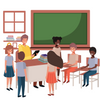Today’s language learning environment offers a wealth of information for all ages and levels of learner, with everything available online at the click of a mouse. However, even for adults, this abundance of information can be overwhelming and difficult to navigate. For young learners, it can be even harder.
When going online to find the meaning of a word, the young learner is presented with a variety of options including a number of online dictionaries. However, for a young person, there are many potential difficulties:
· Distracting and potentially inappropriate advertising on commercial sites
· An abundance of confusing content, not child-friendly and aimed at a higher level of learner
· Unsuitable content or examples
· Additional navigation required
For example, a young learner might be given a learning task:
Draw a picture to illustrate the preposition ‘under’ in the following sentence – “The children found a ball under the table.”
So, the young learner goes online to check on the meaning of ball and:
1) Looks up an standard online dictionary: is presented with confusing and incomprehensible information which is above level for young learners
2) Looks at a children’s online dictionary: offered better results but additional navigation is required to find the relevant information
Print primary dictionary and reference titles, such as the Collins Cobuild Primary Learner’s Dictionary, on the other hand, have been carefully and specifically curated for younger learners to both avoid these pitfalls and to offer other benefits to the learner. Using print primary dictionaries can ensure that young learners are able to access information which is age and stage appropriate in a safe environment as well as develop skills and knowledge that will stand them in good stead for the future.
Let’s look at the entry for ‘ball’ in the Collins Cobuild Primary Learner’s Dictionary:

The entry for ‘ball’ shows the 3 main meanings relevant at this stage, with CEFR levels showing the level of vocabulary. The definitions clearly explain each meaning and the examples are simple and child-appropriate.
The obvious advantage of online reference materials is its immediacy – it can offer the learner the answer in seconds. Using a print dictionary is a skill that has to be learnt in order to make dictionary use efficient and beneficial. Dictionary skills do not always need to be discretely taught, they can be introduced into the classroom through games, starter/finisher activities, and so on. And the skills learnt for using a dictionary effectively are transferable to other types of learning.
Here are some suggested activities to help students with alphabetical order and spelling both of which help learners to find a word quickly and easily in the dictionary and practising familiarization with the order of the alphabet and the names of the letters:
- Say/Write a letter and students have to write the letter before/ after/3 letters after etc. For example: What letter comes 2 letters after letter Q? Write down the letter before Y.
- Give students challenges using the alphabet. For example: Find something in the room beginning with the letter after E? Can you think of an animal that starts with the letter before T? Stand up if your name starts with the letter before Q!
An activity that practises all four skills of listening, speaking, reading and writing is Running Dictation:
- Write words on cards or Post-Its® and spread around room. Students work in pairs: one goes up to read a word from card and comes back to their partner. They say the word to their partner (spelling it out if necessary to ensure the correct spelling) who writes it down. The pair can then alphabetise the words, look up each word in dictionary and read/write out the definition.
- As an extension to this activity for higher-order skills is to create cards in thematic groups eg rooms in the house, animals (pets/wild/reptiles etc). Students then need to find words in the same group (have some words that could belong to more than one group to encourage discussion). This activity can also be done with pre-taught words for a particular topic.
There is a wealth of additional information in the Collins Cobuild Primary Learner’s Dictionary which gives additional support to young learners, for example notes on English usage and tricky pronunciations; illustrations to help with vocabulary learning; and supplements for vocabulary acquisition. Again, there are a number of fun classroom activities to help young learners make the most of this information.
Here are a couple of ideas:
- Language notes: Students find one of the notes in the text, then illustrate & share/present the information with peers.
- Illustrations: Use an illustration of related words (for example, shade/shadow) and ask students to write a sentence using each word in context. Or give students the definitions of two related words (for example, cup/mug) and ask them to draw pictures of the words using only the definitions.
- Supplements: Create a word-search with common words (or students can make their own) or play Word Association with pre-taught curricular words on a theme eg art: pencil/charcoal/brush etc. Go round the class with students being ‘out’ if they hesitate too long or repeat previous words. Other dictionary activities for young learners are available for free online at https://collins.co.uk/pages/elt-cobuild-reference-cobuild-worksheets-resources
There is no doubt that the importance of a safe learning environment is essential for all learners, and particularly young learners. A print young learner’s dictionary that has been compiled to be age and stage appropriate certainly provides this and gives the learner a strong foundation for future language learning.
This blog post was written by Maree Airlie. Maree is a lexicographer working in the Languages Team for HarperCollinsPublishers. She is also a qualified primary teacher in the UK.
Find out more about our new edition of the Collins COBUILD Primary Learner's Dictionary.
